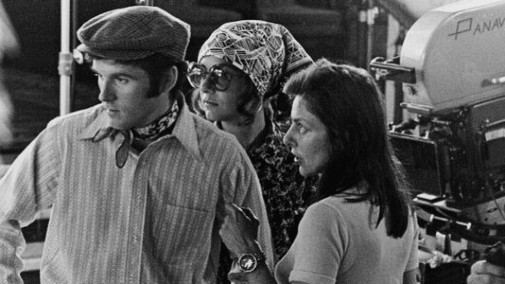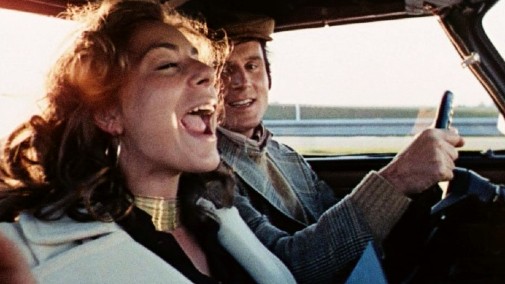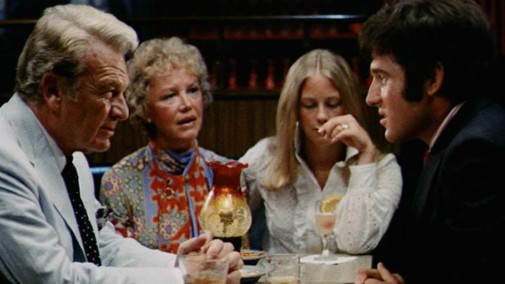May Retrospective: “The Heartbreak Kid” (1972)
 Wednesday, May 20, 2020 at 8:30AM
Wednesday, May 20, 2020 at 8:30AM 
After many years redefining the paradigms of American comedy along with Mike Nichols on the New York stage, Elaine May made the jump to the movie business when she appeared as an actress in some late 60s cinematic endeavors, including Mike Nichols' The Graduate. It wouldn't take long for her to branch out and, by 1971, she was writing, directing, and starring in A New Leaf.
In our last piece about this intrepid artist, we looked at that movie and how May's genius was able to transcend the interference of pushy producers and remain a near-masterpiece. This time, we'll be looking at the picture May directed after that flick, a production that suffered much less interference from panicky executives. It's also the only picture May directed she didn't also write and the single one of her movies to ever be nominated for the Academy Awards.
We're, of course, talking about the Neil Simon-penned The Heartbreak Kid…

The protagonist of May's second movie may not have any murder plans going on in his sick head, but he's no less repulsive than Henry Graham. He's Lenny Cantrow, a newlywed played by the director's greatest muse, Charles Grodin. On his Floridian honeymoon, the Jewish New Yorker meets a WASPy younger woman and promptly decides to leave his wife for her.
Misogynistic to the extreme, the basic plot of The Heartbreak Kid is nonetheless twisted into something uglier and more feral by the way May chooses to present it. She straps us into Lenny's mind, turning his wife, played by May's real-life daughter Jeannie Berlin, into a creature of revulsive candor and annoying habits, and making his petty whining be delivered with total sincerity and not a drop of self-awareness. It's a cruel affair, but the final product is a jewel of corrosive social critique, caustic humor at its most unforgiving and a character study made of equal parts empathy and hate.
The cast is of particular excellence, with Grodin the perfect vessel for May's vision, while Berlin explodes with searing humanity and Cybill Sheppard gives life to a mirage of youthful splendor. Berlin went on to be nominated for the Best Supporting Actress Oscar for her work, while Eddie Albert, as Sheppard's curmudgeon father, conquered a Supporting Actor nod.

Unfortunately, this is the only Elaine May-directed feature that's not currently available to stream at the moment. That said, someone uploaded it to Youtube, so you can find it there. This is a film that deserves to be watched in all its upsetting glory.
[For more on this film, check out last year's Smackdown episode about 1972]



Reader Comments (4)
Neil Simon is known for adaptations of his Broadway comedies that are equivalent to hit TV situation comedies. The movies get the laughs they seek and are forgotten by the time the audience arrives home. Simon wrote the screenplay for the 1972 comedy The Heartbreak Kid. The screenplay was adapted from a short story by a writer Simon long admired, Bruce Jay Friedman. The cringe-inducing comedy and character-based laughs were a sidestep from Simon’s typical situation comedies.
Simon wrote the screenplay during his beloved first wife’s battle with cancer. That may well have contributed to his creation of the unexpectedly dark comedy. As was typical with his screenplays, his contract contained a specific clause that every word must be spoken as written without variation. Simon was needed during his wife’s last days. Director Elaine May convinced Simon to give her authorization to make changes. May had developed her talent in a famed comedy team with Oscar winning director Mike Nichols. She thrived on improvisation and used it extensively while filming The Heartbreak Kid.
The story follows Leonard Cantrow, a three year Army veteran, who will soon marry Lila Kolodny, a 21 year old virgin. Despite Leonard's best efforts, Lila denies Leonard sex till their wedding night. The event is disappointing. Leonard finds his bride’s need for assurance annoying and doesn’t want to talk after lovemaking. Their honeymoon is a road trip to the beach in Florida. At one stop, Lila eats a messy egg salad sandwich with great enjoyment. The resulting and untended smear of egg salad across her face repulses Leonard.
For audience members who have endured long confinement at the start of a new relationship, the experience is telling. Ticks and idiosyncrasies become apparent and test the bonds of affection. Lila loses. After she refuses Leonard's offer for sun screen on their first beach day, she is horribly burnt. While Lila is recuperating in their hotel room, Leonard and a young and affluent college coed Kelly Corcoran engage in serious flirtation. Leonard must have this blonde beauty and impulsively decides to end his marriage to woo and win her.
Charles Grodin was 37 when cast in this role of a man in his early 20s. He lost most of his excess body weight to gain the lean look of a young man and wore a hairpiece to mask his age. It is effective. Leonard frequently reminds characters of his three years of Army service and how it aged him.
Leonard Cantrow is a horrible human being. His immediate distain for his new bride alienates him from the audience. His desire to throw away his three day old marriage for a stunning WASP girl makes him more despicable. Director Elaine May films the scene where Leonard dumps Lila in a Florida seafood restaurant. Like the beach resort where the newlyweds are staying, the eatery is a favorite for vacationing Jews. As Lila understands Leonard’s mealy mouth wish for an annulment, May continually cuts to the older Jewish women at neighboring tables listening to Leonard’s fumbling excuses and Lila’s hurt. At first funny, the faces embolden our anger at the public humiliation Lila is enduring. And yet we are still laughing. Grodin is masterful at making us dislike Leonard and still root for him to get the other girl.
Simon had advocated for then noted Broadway comedy actress Diane Keaton to play Lila. May disagreed. She felt the comedy required an actress who was not so attractive. She cast unknown Jeannie Berlin. Berlin was simultaneously hilarious and heartbreaking. She appeared to have no vanity and willing did extreme close ups with remnants of egg salad or gobs of sunburn cream on her face.
http://1.bp.blogspot.com/-aCX2qApkl9...-egg-salad.png
Her brilliant performance won Oscar and Golden Globe nominations as well as the New York Film Critics Circle Prize for Best Supporting Actress. It wasn’t till filming began that it was revealed that Berlin was May’s daughter. Despite her rave reviews, Berlin subsequently worked very little, twice taking more than a decade off between film projects. Most recently, she has won acclaim as the prosecutor in the HBO miniseries The Night Of.
Two other surprising performances came from this caustic, dark comedy. Cybill Sheppard a model who won the attention of director Peter Bogdanovich in manner similar to Leonard’s attraction to Kelly was very good in the film. In interviews, Sheppard commented that May worked with her on her acting and taught her that listening was important. You can see the effect of May’s tutelage. There is meeting between Kelly's father and Leonard. Sheppard is seated between the two observing. As brutally funny as the scene is, the eye constantly returns to Kelly. The camera keeps both men on either side of the frame. Silent Kelly remains the focus of our eye. We aren't sure if the woman who prompted this man to end his marriage on his honeymoon is the love of her life, an effort to anger her authoritative father, or simply a vacation amusement. All seem possible, and it may be that Kelly is too young to know either. Yet, during the intense discussion her eyes dart from her father to Leonard like watching a tennis match. She smiles slyly in certain moments that only further confuse the viewer on her intent. Throughout the film, May focuses on silent women who observe the actions of men. This frequent technique becomes the director's commentary and our moral compass.
Best Supporting Actor nominee Eddie Albert is wonderful here as Mr. Corcoran. He is a bigot. While the film features a detailed Jewish wedding for Leonard and Lila, May never pushes the obvious hatred Corcoran feels for Leonard Cantrow upon sight. Kelly tells Leonard that her father is moving to a new resort because of the "element" found at this resort. The camera then cuts to the many Jews around the pool deck. The anti-Semitism is clearly evident. Mr. Corcoran is rigid in his stress level. At a nightclub performance Leonard moves a chair next to Mr. Corcoran. Albert, who was long typecast as the affable second banana, visibly conveys the surging rage underneath the surface of this overly protective father. You are never quite sure if his threats are not actually real and Leonard may provoke him to violence. And yet, Albert underplays the moments with a wit that rings laughter out of each encounter.
The film is great. May pays tribute to her former comedy partner Nichols and his Oscar winning The Graduate in the final scene. The camera focuses on Albert tensely observing Leonard chatting with some children. It is a surprisingly caustic comment on this man and how he impacts those around him.
1972 is probably my favourite Smackdown.
When I saw this, a long time ago, I was appalled at how funny it played. I was offended on behalf of his first wife, how dare he treat her that way? However Breslin plays the part for laughs, and is very good. The scene I liked the most was the dinner scene with Eddie Albert who is wonderful at confronting just how terrible Charles Grodin's behaviour is. Cybill Shepherd glows.
I have never seen "A New Leaf", but "The Heartbreak Kid" was a hit and enough of a critical success that Elaine May got a third chance to direct...
Everyone is great in this, but when I watched it for the smackdown, I loooved Cybill Shepherd. So impressed. She was playing the kind of girl I've met plenty in life, but don't often see played so casually onscreen.
And what a great last scene!